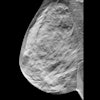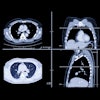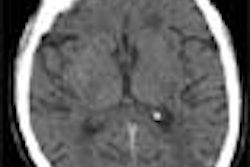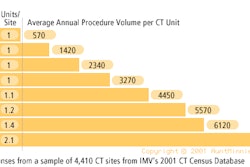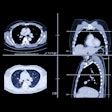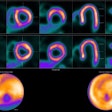CHICAGO - Gastroparesis, a disorder in which the stomach takes too long to empty its contents, can be difficult to distinguish from other diseases which produce similar symptoms such as nausea, vomiting and early satiety. The disease often results from Type I diabetes, when prolonged periods of high blood glucose levels damage the vagus nerve. As a result, the movement of muscles in the stomach and intestines is impeded. Metoclopramide (Reglan) is often effective in stimulating the movement of these muscles.
At Wednesday's gastrointestinal sessions of the RSNA meeting, Dr. Amolak Singh from the University of Missouri Health Sciences center discussed a one-day gastric emptying protocol he developed in cooperation with colleague Dr. Steve Harper, and with statistical assistance from his son, Rubin Singh.
The nuclear medicine protocol was designed to determine gastric emptying, and predict whether the patient will respond to metoclopramide treatment.
"We found that there are no objective criteria...for what constitutes a good response to Reglan." Singh said. "We had 168 patients, with ages from 21 to 90…. These patients were selected from 750 studies since 1989. The clinical [presentation] of these patients included nausea, vomiting, abdominal pain, early satiety, dyspepsia, bloating," and other symptoms, he said.
Following an overnight fast, each patient was given a standard radiolabeled scrambled one-egg meal using 1-2 mci of Tc-99m sulfur colloid 90 minutes before anterior and posterior acquisition of scintigraphic image data. The gastric emptying half-time (GET) was then calculated from the decay-corrected mean geometic gastric counts, Singh said.
"If GET [was] prolonged, more than 100 minutes, then we would give them 10 m of Reglan intravenously, and images were taken for an additional 30 minutes," recalculate GET and compare it with the baseline.
One hundred sixty-eight patients with GET >100 minutes were analyzed. Pre- and post-GET were 348 ° 295 and 103.8 ° 188 (p<0.00001) minutes respectively. The mean reduction in GET relative to baseline was calculated in an effort to establish a threshold that would indicate a good response to the metoclopramide.
"Twenty-two percent of patients had gastroparesis ... based on the response to Reglan," Singh said. "Patients with mild gastroparesis had gastric emptying half-time of 140 minutes, and severe gastroparesis, 100 minutes. Clearly, gastroparesis is not related to gastric emptying response to Reglan.
"The one-day gastric emptying protocol is useful for identifying patients with gastroparesis. Quantifiying the response to Reglan may be useful in patients with gastroparesis, and patients with no response may not be good candidates for pro-kinetic therapy," Singh said.
Session moderator Dr. Harvey Zeissman offered a caveat to the study, stating that when metoclopramide is given orally, patients often get symptomatic relief even though their gastric emptying hasn't improved, so a gastric emptying study would also be needed to confirm gastroparesis.
By Eric Barnes
AuntMinnie.com staff writer
November 29, 2001
For the rest of our coverage of the 2001 RSNA meeting, go to our RADCast@RSNA 2001.
Copyright © 2001 AuntMinnie.com
